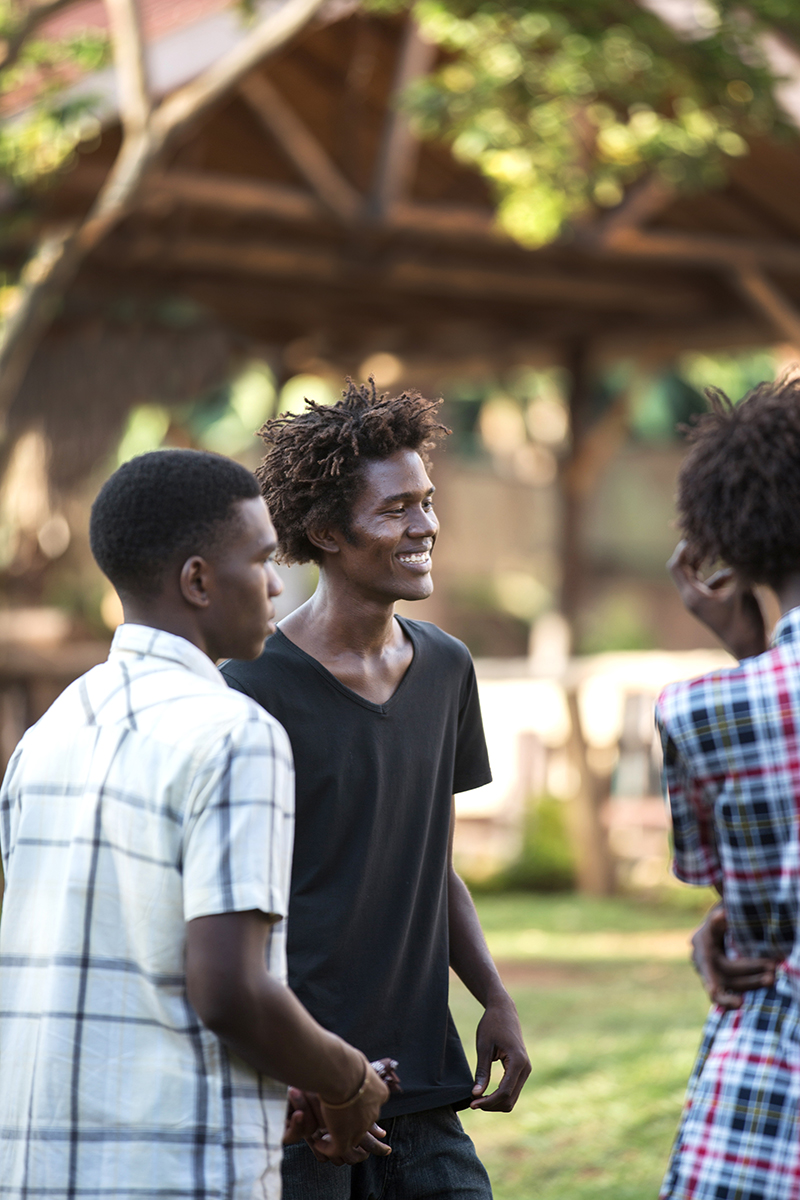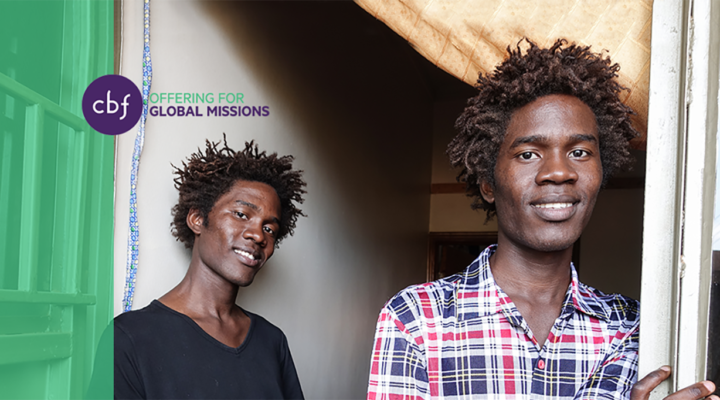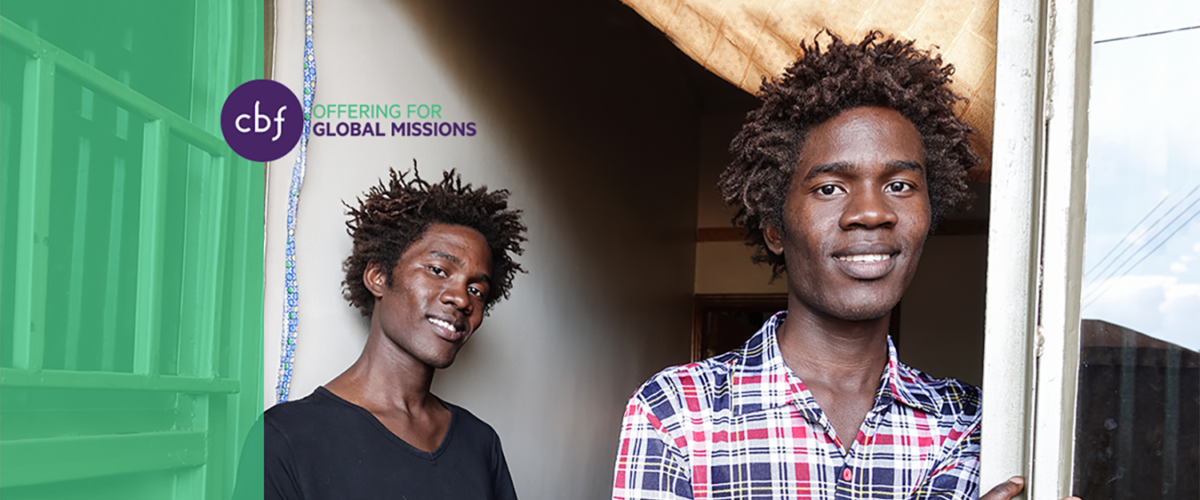The impact of welcome: The Story of Jacob and Esau
In the Bible, twins Jacob and Esau are anything but brotherly. Trickery, betrayal and estrangement destroy their relationship. Jacob cheats his brother and flees his homeland, leaving his twin behind.
Jacob and Esau Francis, twins from South Sudan, proudly bear those famous names but nothing of those traits. Together, they fled war in their homeland as teens. Together, they lived on the streets of Uganda’s largest city. Together, they found rescue and friendships at Refuge & Hope, a Christian ministry in Kampala founded by Cooperative Baptist Fellowship field personnel Jade and Shelah Acker. Now the young men spend their days there with other young refugees also trying to rebuild their lives.
But every evening, they leave the peaceful ministry center and head back into the city to their temporary home, where each night they battle the demons that followed them to their adopted homeland — still together and yet alone.
Soon after South Sudan gained its independence in 2011, internal factions started fighting for control of the government. In 2012, Jacob and Esau found themselves in the middle of the fighting, and the lives of these teenagers changed instantly and forever.
“They attacked us,” Jacob said of rebel soldiers. “They started shooting the vehicles. They shot a friend who started bleeding. I felt like we [were] the next to die.”
Away from home at the time, Jacob and Esau had to act quickly and decisively. They ran. Suddenly running for their lives, they couldn’t even say goodbye to their family — nor have they seen them since.
“Jacob and Esau had to act quickly and decisively. Running for their lives, they couldn’t even say goodbye to their family — nor have they seen them since.”
The twins got a life-saving break when they hooked up with a convoy sent by the Ugandan government to rescue its own people. “We had to sneak in with their citizens,” Jacob said.
The Ugandans knew they didn’t belong but covered for them until they reached the border. Alone but together, the twins took a roundabout path into Uganda, passing through a neighboring country first. “It was a desperate journey,” Jacob recalled — one that is today still far from over.

Without parental support or scholarships, the twins cannot further their education. However, they constantly seek to expand their knowledge and find new opportunities.
Months later, as they listened to a Christian youth worker read a Bible story, the boys were shocked to learn they bear the names of maybe the world’s most famous twins.
It was a bittersweet discovery. “I never even took time to ask my mom, my father, ‘Why did you give me that name Jacob, and my brother Esau?’”
“I wish I could have that moment, but it’s already gone,” he said sadly.
They have tried but haven’t been able to track down any relatives in South Sudan, and they later learned their father was shot in the fighting between warring factions. They’ve never heard for sure, but they presume he is dead.
In 2013, the turmoil in South Sudan erupted into full-blown civil war. An estimated 300,000 people have been killed. More than a third of the population (four million) has been displaced, including at least one million people who, like Jacob and Esau a year earlier, left the country.
Their story is reminiscent of the “Lost Boys of Sudan,” the estimated 20,000 orphaned and displaced boys who more than a decade ago fled southern Sudan on foot. While that tragedy sparked international outrage and rescue efforts, the latest, smaller exodus has gone largely unnoticed outside the country.
Once in Uganda, with South Sudan’s fighting behind them, they felt safe but still not secure. “When we reached Uganda, life wasn’t that good,” Jacob said. “Life is tough.”
In 2013, the turmoil in South Sudan erupted into full-blown civil war. An estimated 300,000 people have been killed. More than a third of the population (four million) has been displaced, including at least one million people who, like Jacob and Esau a year earlier, left the country.
Although Uganda freely accepts refugees, their new lives have been far from easy. Like most new arrivals, the twins went first to one of four massive, overcrowded refugee camps near the nation’s borders. Conditions there are harsh, resources few.
Situated near the center of the continent, Uganda is a magnet for refugees from the impoverished and war-torn countries all around. Unlike in many countries, refugees are free to leave camps and settle elsewhere, and life outside is little better. Those who leave usually go to the capital, Kampala, a city of 1.5 million, where a third of young adults are unemployed.
Like refugees worldwide, Jacob and Esau had big dreams. At first, they were among the lucky ones — they had a sponsor who paid for their schooling in South Sudan and again in Uganda, which like much of Africa, doesn’t offer free education. The school also provided them a place to live. They finished “senior six,” the equivalent of high school. But once they graduated, they were required to leave the school.
“We ended up on the street,” Esau said. “We had nowhere to sleep.”
At least back home they had a home, bed and friends, he said. On the street, there are only other desperate people. “They come and beat you and steal your property, just the little you have,” Esau said. “[In] truth, we just spent our nights in clubs.”

Life for urban refugees is challenging. Without a home or parental support, Jacob and Esau found themselves hanging out in clubs and bars to stay safe at night.
The twins hid in several of Kampala’s 24-hour nightclubs. “We [would] just go there, spend the night to be safe,” Esau explained. “It [was] just to survive, to not be arrested, to not be attacked by the robbers at night.”
Street life takes a toll. Now 19 years old, both Jacob and Esau battle depression and even thoughts of suicide.
“I keep blaming myself [or] my God,” Jacob confessed. “I don’t know whether God wants us to live in this way, to leave our parents. I don’t know whether this life is meant for us.”
But the streets also brought good news — a tip from other refugees.
“They told us, ‘There’s some place called Refuge & Hope,’” Esau said. “Let’s go there and have fun with the youth there, and we found ourselves at Refuge & Hope.”
Ironically, the ministry was founded in 2004 by Jade and Shelah Acker to rescue nine child soldiers and street children from what is now South Sudan. Now the Ackers and their 50-member staff offer emergency assistance and other services to all refugees.
Although Refuge & Hope is not a shelter, its social workers help refugees resettle. It provides crisis counseling, job training, English classes, life skills, business classes — a full menu of services to help refugees find their way and hold onto their dreams.
Refugees get help finding a job, housing and social services. The center sponsors young children in local schools and offers GED certification to older ones. At the heart of the ministry is a broad curriculum that teaches adults English, employable skills, entrepreneurship, business finance, practical life skills and more. Approximately 1,000 students enroll each year in classes at Refuge & Hope.

Youth at Refuge & Hope enjoy spending time with youth program directors Haryet and Allono, as well as founders and directors Jade and Shelah Acker.
The refugees who flock to the ministry often bring children, and some children arrive unaccompanied. “Somehow the children kept coming to my office,” recalled Haryet Hamony, who handled the center’s finances at the time. “They called it the [youth] office. I got less done.”
“I talked to Jade and Shelah, and we decided to have a program for the youth in the afternoons,” said Hamony, who now is youth director. “I would do the finance in the morning and then have the youth group in the afternoon. Since then, we’ve never looked back.” The youth meet every day after school, giving them a safe place and a social network. There are 80 involved now, Hamony said, and range in age from about 12 to 24.
“We have different people from different countries — Somalia, South Sudan, Sudan, Ethiopia, Eritrea, Congo. They create harmony…they end up calling each other brother and sister.”
Jacob and Esau liked what they found there, so they kept going back. They figured It was better than hanging out in bars.
“Instead of just loitering around the street being idle, I thought, ‘Why don’t I come and volunteer?’” Esau said. Eventually, Jacob and Esau started working every day as volunteers in the youth department. They especially like to help the younger refugees. Soon they were studying the Bible and learning about God from Hamony.
“She said, ‘Please spare time for God and try to know God more,’” Esau remembered. “Before, I wasn’t even interested in learning Bible. But that’s what has been helping me. Now I’m closer to God.”
The boys also were struck by the way, among the youth, natural enemies accepted each other — ethnic groups who were at war in their homelands worked side-by-side.
“We have different people from different countries — Somalia, South Sudan, Sudan, Ethiopia, Eritrea, Congo,” Esau said. “It’s so wonderful! You find a Muslim learning the Bible. You find a Christian wants to know about [Islam]. They create harmony in that place. They end up calling each other brother and sister,” Esau said.
Jacob and Esau volunteer for or help organize many of the programs and events the youth department sponsors, such as a children’s camp, a talent show, music, cultural dances, Bible studies — even a presentation on gender-based violence.
The twins also operate a small popcorn-selling project. “It may not be a huge amount of money,” Esau said, but it pays the school fees for one elementary child.
“They are the life of the youth group in many ways,” Hamony said of the twins. “A lot of the younger youth really look up to them.”
The most transformative project the department conducts is an annual peace conference, where youth from many ethnic groups and nations spend several days in a retreat, learning about tolerance, reconciliation and peacemaking. The results are powerful and moving, Hamony said.
“I thank God for the directors for having such an organization in Uganda. If this organization wasn’t here, I don’t know where I would be right now.”
For the twins, who have encountered ethnic strife and discrimination their whole lives, the youth group has redefined peace and home. “I find hope here,” Jacob said. “People encourage each other. I feel like this is a home.”
Last year, the youth department became home in more ways than one. With still no place to live, the twins started sleeping in the youth office.
When Hamony found them sleeping in her office, she looked the other way. “I couldn’t kick them out,” she said. Only then did she learn they were alone with no family or place to stay. “How can someone live that way?” she said.
When Shelah Acker heard the twins were sleeping on-site, she called them into her office to find out the whole story. Initially the twins were scared they would be back out on the street. Instead, Shelah and other CBF personnel found Jacob and Esau a place to stay. “I know it might not be a pretty place, but at least we have somewhere to put our heads,” Jacob said.
That hasn’t solved all their problems, of course. Even now, their existence is hand-to-mouth. “We eat once in a while,” Esau said. “Sometimes we don’t eat; just take water.”
Jacob and Esau still bear emotional scars from the violence and racism they have experienced. Their father was from the north, a Sudanese man with dark skin typical of that Arab population. Their mother is South Sudanese, an ethnic tradition linked to the more Christianized Central Africa.
Even with a Christian name, Jacob said he encountered racist hatred because of his dark skin. “They consider my color to be [that of] an Arab. Even with the name ‘Jacob,’ they take you as an enemy.”
Both boys, but especially Jacob, have known despair. Haunting thoughts of his past — the violence he witnessed — cause Jacob to question the purpose of his life.
It’s only around the youth at Refuge & Hope that Jacob and Esau find an antidote to the world’s hate. For the twins and many others, the youth department is a respite, an escape from the harsh realities of refugee life — the pain of the past and struggles of today.
“This [is] a place where I can forget all the negative memories and continue with the future,” Jacob explained.
But at night, the young people go their separate ways.
“You start recalling the bad memories,” Jacob said. “No parents. No mom. No one to hold you now. Just on your own, trying to survive.”
If Jacob had his way, the youth would never leave the center. “I wish we had beds here,” he quipped. They could “pass the time talking, having fun, interacting, laughing and forget the nightmare which we went through.”
When Jacob and Esau speak of Refuge & Hope — even in separate interviews — the twins sound like echoes of each other.
“Thank God for this wonderful place, Refuge & Hope,” Esau said. “This place just feels like more than a home to me. Shelah is just like a mother to me, and Jade like a dad.”
“I thank God for the directors for having such an organization in Uganda,” Jacob said. “If this organization wasn’t here, I don’t know where I would be right now.”

Jacob and Esau are part of the newly-developed Men’s Ministry at Refuge & Hope. This tight-knit group provides a safe place for them to express their emotions, be vulnerable and receive psychological support through counseling.
The twins probably saved their lives by fleeing South Sudan, but they lost their family and a lot more. Although they managed to graduate from high school in Uganda, they lost the chance to continue their education. Jacob’s spirit brightens a little when he talks about his educational ambitions. “I did biology, chemistry and agriculture” with hopes of becoming a scientist or doctor, he said. “Actually, I was brilliant — even my twin brother knows.”
Both would like to go to college but know that without funding the chances are slim. “Public health, biotechnology, I still believe the knowledge, it is in me,” Jacob said. “But as time goes on, dreams start [fading] away.”
“No one is there to help my education out. But I pray one day God will make it out for me. If God sends me a good sponsor to support my education, I will go back and pursue the dream.”
Esau dreams of a career in diplomacy, working with an international organization that helps youth. “I want to do international relations. My passion is to lead people,” he said.
It’s a Catch-22 for an untrained immigrant in the job market. Esau said a job that pays enough to allow him to save for college would itself require a college degree.
“I find hope here. People encourage each other. I feel like this is a home.”
Despite that, Esau isn’t making excuses. “I know God is my strength, that I can make it. My circumstance should not stop me from working towards achieving my goals.”
The twins differ about someday returning to South Sudan. Jacob said he doesn’t plan ever to go home, but prays that God will protect his family there.
“I hope one day God will reunite us. I just pray that one day we shall meet, whether in heaven or [else]where.”
Esau also prays for their family, and is more optimistic about returning to his homeland.
“I believe God is there with them.”
“Growing up in South Sudan was so beautiful,” he said. “I’m very proud to be South Sudanese. One day if peace comes, we shall go back, and make South Sudan a better place for people, for the next generation.”
You can give a future and a hope to children and young people fleeing violence. Give to support CBF field personnel around the world to serve and share God’s love. Give today at www.cbf.net/presence
Watch a video story below about Jacob and Esau and learn more about the ways CBF field personnel are cultivating Beloved Community at www.cbf.net/belovedcommunity






